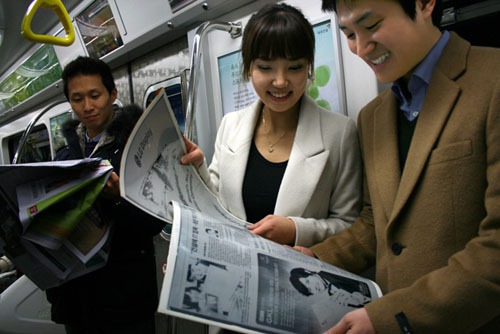If e-reader manufacturers optimize e-readers for reading news (i.e. provide an easy transition from the ubiquitous newspaper), then this would be the first step towards the decline of the newspaper print media and a great stride forward in the digital age. There are several e-readers available, with Amazon.com sparking a lot of interest with its Kindle. However, all e-readers currently available are not ready to replace the newspaper given their small displays and accessibility to news. With LG’s development of a 19in flexible e-reader (see image below), e-readers can move one step closer towards replacing newspapers.
The future e-Newsreader?:
-
Large display e-reader – a bendable, foldable [ collapse into a compact deck of cards? ] display with built in wi-fi, memory, electronic paper , internet access (via mobile service providers) and embedded software.
-
An e-news app store to provide lots of cool software to make news reading much more efficient and effective or such software could be bundled with the e-Newsreader you buy.
-
You purchase your daily news online (or via long-term subscriptions) and the electronic version of the news is transmitted to your e-Newsreader. The electronic version of the news will still have the same content format and look as today’s newspapers, but in addition, you’ll have several cool features at your disposal – zoom in/out, search, bookmark favourite articles, save to memory, etc. – and all these features via touch screen, stylus and voice-recognition technologies.
-
Software will allow you to track a story across several days’ e-news stored in your e-Newsreader’s memory and provide you with a timeline of events.
-
The e-Newsreader will be optimized for displaying newspaper-style news, but will also allow ebooks (several formats) to be read.
Pros:
- Save the planet!! e-news will save a huge amount of paper.
- Significant reduction in production costs for media companies (no printing newspapers), thereby allowing e-news to be delivered at lower rates than today’s newspapers.
- No more rushing, queuing and frantically searching for small change to buy your daily newspaper. Get news delivered whenever, wherever.
- No more littering public transport and other places with used newspapers (perhaps free newspapers like “The Metro” for tube/train travellers in the UK may be transmitted to your e-reader if you have a valid ticket).
- Read news far more efficiently. For example, use the search feature to quickly check the stories that you’re following and then move on to other articles.
- Make information and knowledge much more easily accessible to the public. This encourages more research, better journalism and contributes to building knowledge communities.
Cons:
- The decline/demise of the newspaper print industry means the loss of several jobs.
- You’ll miss the several other benefits of newspapers – street food holder, packing, etc. 😉
e-Newsreaders will have a large market in developed countries. Developing countries won’t have a market for such devices unless they come out of poverty (to make such devices affordable to the genral public) and literacy is high (to get people to use such devices).
Amazon.com initially ran into loads of trouble with its Kindle, primarily due to some daft decisions (like catering to only US mobile network technologies, thereby preventing world-wide distribution) and like other e-readers, it’s primarily aimed at reading e-books (although the latest Kindle DX aims to make reading news easier with a larger display. Amazon.com’s framework of using the Kindle with its Whispernet was a step in the right direction, but lack of planning caused them many issues.
Knowledge and information are key to a country’s development and consequently making knowledge and information more easily accessible should be the key driver behind devices such as e-readers. However, for this digital dream to become the common man’s reality, a helluva lot of work has to be done and large organizations and governments must work cooperatively with each other.

